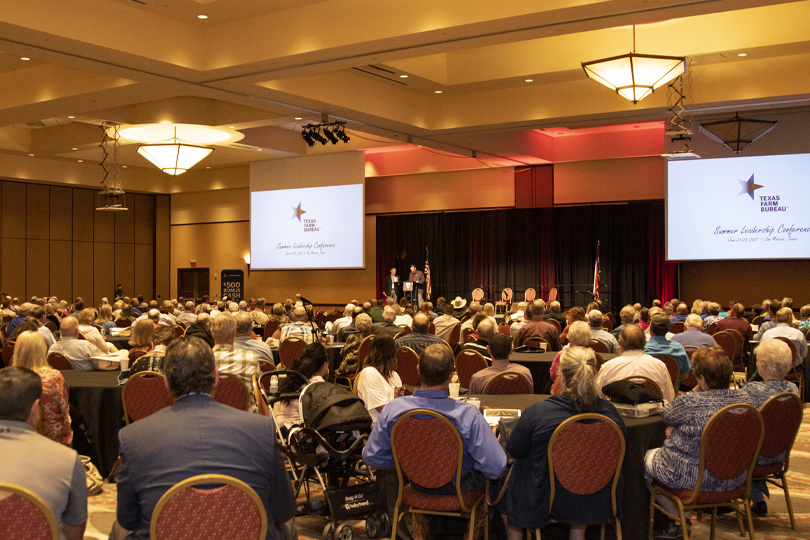By Julie Tomascik
Editor
Climate, the meat packing industry and trade were among the topics highlighted during the Texas Farm Bureau (TFB) Summer Leadership Conference.
About 400 farmers and ranchers were in San Marcos June 21-23 for the meeting.
Carbon markets, climate issues
Discussions about climate are opening up new opportunities for income for Texas farmers and ranchers through agricultural ecosystem credit markets.
“These markets are moving quickly and changing rapidly,” Shelby Meyers, American Farm Bureau Federation (AFBF) economist, said. “There are many things to consider when evaluating whether or not you want to participate in a market designed to sell ag ecosystem asset credits.”
Questions to consider include who will pay for the verification, financial barriers, technical support and rural broadband, education and how to ensure data privacy.
As more information becomes available about the credit systems and market opportunities, AFBF will provide updates in Market Intel reports. Those reports can be found online at fb.org/market-intel or on TFB’s Climate Issue Resources webpage at texasfarmbureau.org/climate.
John Neilson-Gammon, the state climatologist, discussed weather patterns and the regional forecast.
A panel of three Farm Bureau members—Tommy Henderson of Clay County, Barry Evans of Swisher County and Donnie Dippel of Fayette County—discussed soil health and their experiences with cover crops.
Beef packers, alternative proteins
The beef packing industry is under much scrutiny with calls from agricultural organizations and lawmakers to investigate the cattle market.
Kate Miller, the chief operating officer for Fort Worth Meat Packers, shared what it takes to run a packing plant—the costs, labor and other challenges associated with turning live cattle into marketable beef—with TFB members.
“Packers need cattlemen and cattlemen need packers,” she said. “But it’s important to remember that beef and cattle aren’t the same commodity.”
The packing industry has been in a consolidation pattern, leading to a larger supply of market ready cattle than packers can process. Compounding the issue were historic events like the Holcomb fire in 2019, pandemic restrictions and labor shortages that temporarily slowed down processing.
These market interruptions and consolidations have led to wide differences in the value of cattle compared to beef.
Miller followed up with insight from her career in the meat industry and experience opening Fort Worth Meat Packers, which processes about 1,500 head a week, informing members there are extreme challenges in expanding processing capacity in the near future.
An educational session on plant-based alternative proteins included a sampling taste-test of three Gardein products and a discussion on alternative protein history and current market trends by Matt Walters, H-E-B’s director of Meat Procurement.
An update on the beef checkoff was provided by Molly McAdams, the new Texas Beef Council executive vice president.
She highlighted promotional efforts and advertising campaigns by the checkoff to strengthen demand for beef. McAdams also shared information about outreach efforts with dietitians, teachers, students and chefs.
Trade, economic outlook
Engaging world customers helps keep U.S. agriculture growing.
“About 97% of the world’s population lives outside the U.S.,” Kyle Gilliam, manager of Global Strategies and Trade for the U.S. Grains Council, said. “Free trade agreements are how we advance our overall trade, and it’s important to continue developing relationships all across the world.”
Since over 20% of U.S. agricultural production is exported each year, trade plays an important role in the economic outlook for agriculture.
Dr. Bart Fischer, co-director and assistant research professor at the Texas A&M Agricultural Food and Policy Center, talked about that outlook and factors to consider.
The International Monetary Fund predicted a sharp V-shaped economic recovery in the wake of the coronavirus pandemic. While Fischer said the prediction has held true so far, the agricultural sector may be impacted by one or more factors soon. Exports, cattle markets, inheritance taxes, environmental actions and government farm assistance programs can all cause major shifts in agricultural economics, according to Fisher.
The next farm bill will also play a role in the agricultural economy.
87th Texas Legislature recap
TFB Government Affairs staff discussed legislative wins during a panel discussion. Several of TFB’s legislative priorities, including eminent domain, feral hog control and rural broadband, were signed into law by Gov. Greg Abbott.
Additional conference sessions
Additional sessions during the conference covered pesticide regulations and registrations by Dave Tierney with Bayer Crop Science.
Texas A&M AgriLife Extension Service Director Jeff Hyde provided an update on opportunities and challenges facing the agency, and TFB Director of Communications Gary Joiner shared how to fact check news sources and information you find online.

